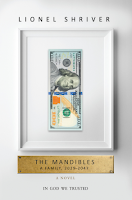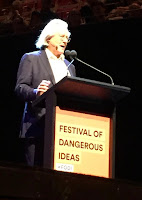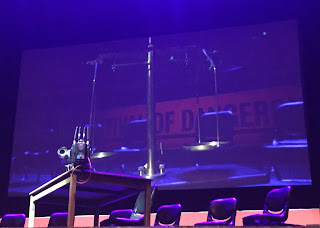As a frequent FODI goer, when this year's program was released I was slightly underwhelmed. The program seemed a bit blokey and not as dangerous as I would have liked. Perhaps hosting the All About Women Festival in March has seen a shifting of the program with a few women who would be speaking at FODI, moving over to AAW. Normally there are multiple sessions competing for my attention, all taking pace at the same time. This year, I picked my eight sessions and did not feel I was missing out too much on other talks taking place at the same time.
Here is a summary of what I saw during my FODI:
Day One - Saturday 3 September 2016
Break a Rule a Day - Lionel Shriver
 I was keen to hear Lionel Shriver speak as she is a bit of a mystery to me. I have never heard her interviewed or read much about her. I thoroughly enjoyed her novel about an American school shooting We Need to Talk About Kevin (2003) and have admired her writing. She is a prolific author of thirteen novels and while I have not yet read her latest novel, The Mandibles (2016), about the collapse of America, I have read number of positive reviews.
I was keen to hear Lionel Shriver speak as she is a bit of a mystery to me. I have never heard her interviewed or read much about her. I thoroughly enjoyed her novel about an American school shooting We Need to Talk About Kevin (2003) and have admired her writing. She is a prolific author of thirteen novels and while I have not yet read her latest novel, The Mandibles (2016), about the collapse of America, I have read number of positive reviews.
At FODI, Shriver sat down with Michael Williams to talk about being a libertarian in America, her opposition to a ridiculous tax system and her inability to vote for Clinton or Trump. Shriver isn't one for laws, rules or conventions. She spoke about being a cyclist and having to obey traffic rules, the thrill of jaywalking, and refusing to conform.
 |
| Michael Williams and Lionel Shriver |
For all her talk about blind obedience to draconian rules, I didn't find her thinking overly controversial. It was an interesting discussion, but not really dangerous.
Two of my favourite journalists are Annabel Crabb and David Marr. No matter how many times I see them, they are always fresh, witty and intelligent. Both of them have written Quarterly Essays on the current leaders of our main political parties, and this session - after the first Parliamentary sitting week and around six weeks after the election results were known - was a timely discussion about the government we now have.
Like an old married couple, the two bantered and quipped about the rise and fall of fortunes of Malcolm Turnbull and Bill Shorten, the diabolical Senate, and current issues the government needs to (but probably won't address) such as refugees, climate change and marriage equality. The most dangerous idea from this session was David Marr's thought that Turnbull could cement his leadership and secure a long career as Prime Minister by challenging the hard right of his party and addressing the key issues that actually matter to Australians.
 |
| David Marr and Annabel Crabb |
 I love Professor AC Grayling, and I will attend him talk about anything. Last year he spoke about education, which is a particular interest of mine. This year he was talking about the 17th Century and the explosion of thinking that came from the likes of Descartes, Spinoza, Locke, Hobbes, Galileo and others.
I love Professor AC Grayling, and I will attend him talk about anything. Last year he spoke about education, which is a particular interest of mine. This year he was talking about the 17th Century and the explosion of thinking that came from the likes of Descartes, Spinoza, Locke, Hobbes, Galileo and others. Grayling spoke for much of the hour about how minds were opened during this period, and he didn't really get around to the modern mind closing until the questions at the end. His point was essentially that censorship
Grayling spoke for much of the hour about how minds were opened during this period, and he didn't really get around to the modern mind closing until the questions at the end. His point was essentially that censorshipI didn't get a copy of his latest book The Age of Genius - the 17th Century and the Birth of the Modern Mind (2016). It looked very interesting but I still haven't got around to the Grayling I picked up last year, so I exercised restraint.
Why Black Lives Matter - Stan Grant and Alicia Garza
 |
| Stan Grant and Alicia Garza |
 She spoke about casual racism, institutionalised disadvantage and white privilege. She was then interviewed by Stan Grant, journalist and author, and they spoke about Australia's indigenous people and their plight. I am keen to read Stan Grant's book Talking to My Country (2016) about being aboriginal in modern Australia.
She spoke about casual racism, institutionalised disadvantage and white privilege. She was then interviewed by Stan Grant, journalist and author, and they spoke about Australia's indigenous people and their plight. I am keen to read Stan Grant's book Talking to My Country (2016) about being aboriginal in modern Australia.This was an informative, powerful session, and a great way to end the first day of FODI.
Day Two - Sunday 4 September 2016
On a beautiful sunny morning, I headed back down to the Opera House for another day of great discussion.
Thatcher Made Me Laugh - Alexei Sayle
 Richard Glover interviewed British comedian Alexei Sayle about the latest instalment of his memoir, Thatcher Stole My Trousers (2016). They spoke about Sayle's upbringing in Liverpool, how he became a comedian, his time on The Young Ones, and the challenges of stand up. Sayle's family life was challenging, growing up with a hard to please Communist mother.
Richard Glover interviewed British comedian Alexei Sayle about the latest instalment of his memoir, Thatcher Stole My Trousers (2016). They spoke about Sayle's upbringing in Liverpool, how he became a comedian, his time on The Young Ones, and the challenges of stand up. Sayle's family life was challenging, growing up with a hard to please Communist mother.
There were lots of laughs in this session, as would be expected. Glover asked an interesting question about dysfunctional families giving rise to comedians, to which Sayle agreed and spoke about the ability to control a room when your own life is out of control. This was an unusual session for FODI. Not so much a dangerous idea as comic relief. But it was a fun way to start the day.
The Propaganda Machine - Dee Madigan
 Dee Madigan is an advertising guru, well known for her regular appearances on The Gruen Transfer. She has managed many political campaigns for the Labor party, including the Queensland state elections won by the relatively unknown Annastacia Palaszczuk, and the recent Northern Territory election which saw a record swing against the incumbent Country Liberals.
Dee Madigan is an advertising guru, well known for her regular appearances on The Gruen Transfer. She has managed many political campaigns for the Labor party, including the Queensland state elections won by the relatively unknown Annastacia Palaszczuk, and the recent Northern Territory election which saw a record swing against the incumbent Country Liberals.Madigan spoke about political advertising and showed examples of historical advertising (although her powerpoint was shocking). She spoke about the propaganda in the latest federal campaign (e.g. mediscare) and how it works. This was an interesting, humorous session about politics and advertising and it was great to learn from Madigan's experience.
 |
| Michael Williams and Dee Madigan |
 |
| The scales of justice at Mercy |
The panel included AC Grayling, feminist and Shakespeare scholar Germaine Greer, former High Court Justice Michael Kirby and Deng Adut, a former Sudanese child soldier who came to Australia as a refugee and is now a lawyer. They dissected Shakespeare's work and then talked about the lack of mercy in modern Australia - as evidenced through our stance on refugees, aboriginal children in custody and the like.
It was a fascinating way to bring this subject to life - smart, thought-provoking, and creative. I really enjoyed this and could have stayed longer with this session.
That was my FODI for 2016. Overall I felt it wasn't as strong as past events, but perhaps I didn't pick the most dangerous subjects. I didn't think there was enough to chose from and I find that there is a distinct lack of women speakers at the event (made up for by the All About Women Festival?).
There was a fair amount of controversy in other sessions, particularly as Andrew Bolt was speaking and a police presence was required to search attendees prior to entry. I didn't attend as I can't stand him and wouldn't pay money to hear his bile.
Normally I come home from FODI with a bag load of books. This year I only bought one - Philippe Legrain's Open World - the Truth about Globalisation (2016). I missed his session but am keen to read his book.
My previous festival experiences can be seen on this blog:



